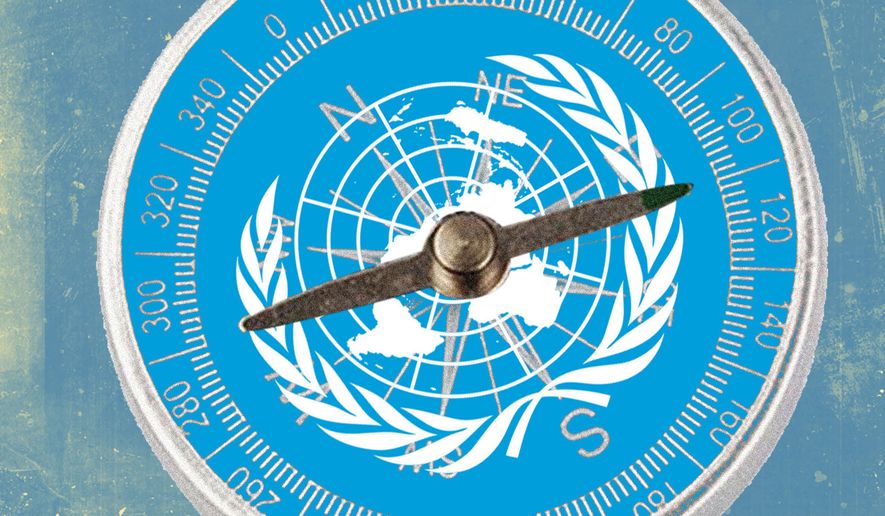A version of this story appeared in the daily Threat Status newsletter from The Washington Times. Click here to receive Threat Status delivered directly to your inbox each weekday.
OPINION:
The 80th ordinary session of the United Nations will end on Sept. 8, 2026. During the year, the United Nations will have an opportunity to help resolve a few conflicts requiring immediate attention: Ukraine, the Gaza Strip, Sudan, Haiti, Myanmar, Yemen and Libya. Indeed, this is its core responsibility, in line with the theme of the 80th session: “Better together: 80 years and more of peace, development and human rights.”
The wars in Ukraine and Gaza must stop. Russia’s February 2022 invasion of Ukraine, a sovereign nation with 1994 security assurances from Russia, has killed or maimed tens of thousands of combatants and civilians. Efforts by President Trump to end this war have failed, and an emboldened Vladimir Putin has escalated hostilities in Ukraine and probed NATO’s credibility by flying drones into Poland and Romania and violating Estonia’s airspace.
This is the Vladimir Putin who lamented the dissolution of the Soviet Union in 1991 and vowed to re-create the Russian empire. That is what he is doing. His invasions of Georgia and Crimea in 2008 and 2014 were preludes to his invasion of Ukraine in 2022. The Baltic states — Estonia, Latvia and Lithuania — are next on his quest to re-create the Russian empire.
What Mr. Putin is doing is obvious. He got away with Georgia and Crimea and is confident he will prevail in Ukraine with minimal consequences. The United Nations should demand that Mr. Putin halt his invasion of Ukraine and enter negotiations with Kyiv.
Iran’s continued refusal to permit U.N. nuclear inspections and refusal to resume nuclear talks with the U.S. resulted this weekend in the reimposition of sanctions lifted in 2015. Given that Iran has not changed its attitude and in fact has become more defiant, “snapback” sanctions ban nuclear enrichment, establish an arms embargo and ban tests and transfers of ballistic missiles. Iran clearly wants the option to acquire nuclear weapons capability. A nuclear-armed Iran would be an existential threat to Israel, an adversary Iran wants to annihilate, and to the region.
For Iran, it’s about more than acquiring nuclear weapons. Iran is a state sponsor of terrorism, working with its proxies Hezbollah, Hamas and the Houthis to destabilize and terrorize the region. On Sept. 17, the State Department designated three Iraqi militia groups aligned with Iran as terrorist organizations. These groups have attacked the U.S. Embassy in Baghdad and bases hosting U.S. and Canadian forces.
Indeed, the human rights situation in Iran is equally dismal. The 2009 presidential election protests and the 2022 killing of Mahsa Amini by the so-called morality police for incorrectly wearing her headscarf sparked national protests that were brutally suppressed by the ruling theocracy. Nationwide arrests and executions were conducted by a weak and corrupt theocracy that was threatened by the public and its outcry for justice and liberty.
Ensuring that food and water are available to the people of the Gaza Strip is a priority objective, as is ending the bloody war there. The onslaught in Gaza was caused by Hamas’ Oct. 7, 2023, attacks that killed about 1,200 people, mostly civilians, and resulted in the abductions of 251 hostages. This was the bloodiest day for Israel since its independence on May 14, 1948. Hamas is a terrorist organization closely affiliated with Iran, which provides the weaponry and support needed for its acts of terrorism.
The situation in the South China Sea between China and the Philippines could escalate quickly. The irony is that a 2016 ruling by a U.N.-backed arbitration tribunal invalidated China’s expansive claims in the South China Sea, ruling overwhelmingly in favor of the Philippines. The ruling was deemed final and binding, although China has rejected it and continues to defy it.
These are just some national security issues the United Nations should openly discuss and attempt to resolve. The wars and turmoil in Myanmar, Sudan, Yemen, Haiti and Libya also require immediate U.N. attention. This is the mission of the United Nations.
• The author is the former special envoy for six-party talks with North Korea and former director of the National Counterproliferation Center. All statements of fact, opinion or analysis expressed are those of the author and do not reflect the official positions or views of the U.S. government. Nothing in the contents should be construed as asserting or implying U.S. government authentication of information or endorsement of the author’s views.




Please read our comment policy before commenting.